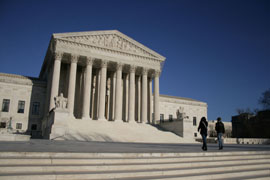Cronkite News has moved to a new home at cronkitenews.azpbs.org. Use this site to search archives from 2011 to May 2015. You can search the new site for current stories.
Supreme Court lets ‘papers, please’ part of SB 1070 stand, rejects other parts
WASHINGTON – The U.S. Supreme Court struck down three parts of Arizona’s SB 1070 immigration law Monday, but upheld a key provision that requires police to check the immigration status of people they stop.
That part of the law needs to be tested to determine if its application conflicts with federal law, the high court said, sending the case back to lower courts for consideration.
Reaction to the long-awaited ruling was swift, and predictable.
Republicans praised the court for letting the “heart” of the law go forward, saying it was a “victory for the rule of law.”
Democrats took the other tack, pointing to the court’s repeated references to immigration as a federal issue that cannot be undermined by states, no matter their “frustrations” with federal policy.
In his opinion for the 5-3 majority, Justice Anthony Kennedy said “the national government has significant power to regulate immigration.” Because of this, he wrote, three of the four challenged provisions in the state law were “pre-empted by federal law.”
“Arizona may have understandable frustrations with the problems caused by illegal immigration while that process continues, but the state may not pursue policies that undermine federal law,” he wrote.
The court rejected parts of SB 1070 that made it a state offense to be in the country illegally, made it a misdemeanor for an undocumented immigrant to seek or hold a job, and gave police the authority to arrest anyone they believed could be “removable from the United States.”
The court upheld section 2(b), which requires that police check the immigration status of suspects stopped for another crime, if the police have “reasonable suspicion” that the suspect is here illegally.
On that part of the law, Kennedy said there was “a basic uncertainty about what the law means and how it will be enforced.” He wrote that federal law does not prohibit such mandatory checks and that there is no way of knowing whether they will lead to prolonged detention of suspects, as opponents argue.
“At this stage, without the benefit of a definitive interpretation from the state courts, it would be inappropriate to assume 2(B) will be constructed in a way that creates a conflict with federal law,” he wrote.
Chief Justice John Roberts and Justices Ruth Bader Ginsburg, Stephen Breyer and Sonia Sotomayor joined in Kennedy’s opinion. Justices Antonin Scalia, Clarence Thomas and Samuel Alito filed separate – sharp – dissents arguing that SB 1070 did not interfere with federal prerogative.
Scalia wrote that Arizona was protecting its sovereignty “not in contradiction of federal law, but it complete compliance with it.”
“The laws under challenge here do not extend or revise federal immigration restrictions, but merely enforce those restrictions more effectively,” Scalia wrote. “If securing its territory in this fashion is not within the power of Arizona, we should cease referring to it as a sovereign state.”
Justice Elena Kagan, who dealt with the case as solicitor general for the Obama administration before being named to the court, recused herself from the decision.
Within minutes of the ruling’s release Monday, Arizona Gov. Jan Brewer was hailing it as “a victory for the rule of law.”
“It is also a victory for the 10th Amendment and all Americans who believe in the inherent right and the responsibility of states to defend their citizens,” she said in a prepared statement.
Rep. David Schweikert, R-Scottsdale, said he was “heartened” that the court affirmed the “heart of SB 1070, Section 2(B).”
“The federal government has failed my state with its inability to properly enforce immigration law,” Schweikert said in a statement. “Now, Arizona with the core of SB 1070, can implement what Washington has failed to do so many times.”
But critics of the law also claimed some victory in the court’s ruling.
President Barack Obama, whose administration sued to block implementation of the measure shortly after it was signed into law in 2010, said in a statement that he was “pleased” the court “has struck down key provisions of Arizona’s immigration law.”
But Rep. Ed Pastor, D-Phoenix, said that while he was pleased that much of the law was struck down, he was “greatly disappointed that it erroneously upheld” section 2(b).
“I’m fearful this troublesome provision will lead to discrimination and racial profiling in Arizona and throughout the country, and I remain supportive of related civil rights suits currently challenging SB 1070 as discriminatory,” Pastor’s statement said.
The case was sent back to the 9th U.S. Circuit Court of Appeals which is expected to send it to U.S. District Judge Susan Bolton in Arizona, who first imposed an injunction on the law.
“There are a lot of eyes on this and a lot of states are watching how this will play out,” said Audrey Singer, a senior fellow at the Brookings Institution.







